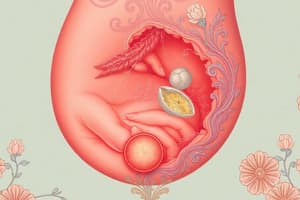Podcast
Questions and Answers
What is the primary function of the placenta?
What is the primary function of the placenta?
- Storage of waste materials
- Production of red blood cells
- Facilitation of oxygen and nutrient supply to the embryo (correct)
- Protection of the embryo from external factors
Which hormone is produced by the placenta during pregnancy?
Which hormone is produced by the placenta during pregnancy?
- Testosterone
- Human chorionic gonadotropin (hCG) (correct)
- Insulin
- Epinephrine
What structure connects the placenta to the embryo?
What structure connects the placenta to the embryo?
- Fallopian tube
- Chorionic villi
- Amniotic sac
- Umbilical cord (correct)
Which of the following hormones is secreted by the ovaries during pregnancy?
Which of the following hormones is secreted by the ovaries during pregnancy?
What happens to hormone levels in the maternal blood during pregnancy?
What happens to hormone levels in the maternal blood during pregnancy?
Study Notes
Implantation and Placenta Formation
- After implantation, trophoblasts develop finger-like projections known as chorionic villi.
- Chorionic villi intermingle with uterine tissue to form a structure called the placenta, which serves as an interface between the developing embryo (fetus) and the maternal body.
Functions of the Placenta
- The placenta is vital for supplying oxygen and nutrients to the embryo.
- It facilitates the removal of carbon dioxide and waste products from the embryo's metabolism.
- The umbilical cord connects the placenta to the embryo, enabling the exchange of substances.
Hormonal Role of the Placenta
- Functions as an endocrine organ, producing hormones essential for pregnancy:
- Human chorionic gonadotropin (hCG)
- Human placental lactogen (hPL)
- Estrogens and progestogens
- Relaxin is secreted by the ovary in the later stages of pregnancy, aiding in childbirth.
Changes in Hormonal Levels During Pregnancy
- Pregnancy triggers a significant increase in various hormones in maternal blood:
- hCG, hPL, estrogens, and progestogens are produced exclusively during pregnancy.
- Levels of cortisol, prolactin, and thyroxine also rise substantially, supporting fetal growth and the mother's metabolic adjustments.
Embryonic Development
- Post-implantation, the inner cell mass differentiates into the embryo, marking the beginning of embryonic development.
Studying That Suits You
Use AI to generate personalized quizzes and flashcards to suit your learning preferences.
Description
Test your knowledge on pregnancy and embryonic development, focusing on the formation and function of the placenta. Understand the role of chorionic villi and the interaction with uterine tissue during this critical phase. This quiz will cover key concepts related to maternal-fetal connections.




